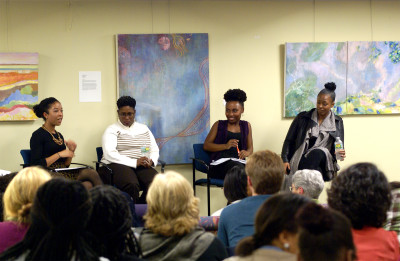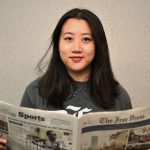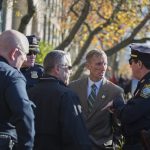
Black women and the black LGBT community are still struggling for involvement in civil right movements such as the national Black Lives Matter campaign, said a group of panelists at the “Missing Voices, Daunting Choices: The Erasure of Black Women in Black American Movements” panel Thursday.
The Association of Black Seminarians and Anna Howard Shaw Center at Boston University’s School of Theology hosted the free panel in BU’s Howard Thurman Center. Approximately 40 BU community members, social workers and Boston residents gathered to listen to the panel of four, made up of two BU faculty and two BU students. The panel discussed a wide spectrum of topics, including Beyoncé, “Scandal” and mass incarceration.
“Unless I talk about it, nobody would know how prison industrial complex influenced my family,” said Pamela Lightsey, associate dean of the School of Theology. “You just have to keep doing the work and stay woke about the oppression. By the end of the day, we have to keep fighting.”
Lightsey said she went to Ferguson, Missouri, last summer to experience the movement and fill the missing African American perspective in the storytelling.
“Who has the control of the … narrative? Largely the story is being told on national television, but how many black women are main anchors on major networks? Few.” she said. “Not long ago, a recent report showed Hollywood films are not as well perceived when there is an interracial couple on the screen. I mean look at “Scandal,” oh my God.”
Saida Grundy, professor of sociology and African American studies in the College of Art and Sciences, said in movements like Black Lives Matter, women were constantly undervalued for their contributions.
“We were writing books before we started saying ‘ain’t I a woman,’” Grundy said. “Recently in Black Lives Matter where queer black women founded the entire movement, but they were completely erased from history. Like [other panelists said] ‘This movement doesn’t have a founder,’ yes it does! They were queer black women.”
Jailyn Gladney, a panelist and senior in CAS, said black women have more ability to let their voices be heard by utilizing social media and other technology.
“There is not only the desire for the story to be told, but the ability to tell the story,” she said. “You can text, tweet, Tumblr, Facebook. The desire and capability can put black women at the forefront of social movement.”
The panel also discussed how allies should empower black women. The best way is to step back and let the women themselves talk about the issue, said panelist Gina Physic, a graduate student of African American studies in CAS.
“I don’t want you to tell the story for me. I want to tell it myself,” Physic said during the question-and-answer portion of the evening. “But, you know it will be good for you to learn about the issue. So keep doing this, because there will be a time when somebody said something off the wall … and black women are not there, you can check them.”
It is also important for the allies to learn about the history of black women, said Ylisse Bess-Washington, the co-host of the event and a graduate student in STH. Otherwise, she said, it may do more harm than good.
“If you were interested in supporting a movement or people, be informed about their history, and also don’t be like you can be the voice of their community, I think sometimes when you speak for an oppressed group, it can silence that person and make them a victim,” she said.
Several attendees said they learned a lot about black women and LGBT social issues from the event.
Seraphim Osiakwan, a senior in CAS, said she learned more about the history and impact of this social issue after listening to the panel.
“It turned out really well. I didn’t expect it to be bad in the first place … the panelists shared more than what I can ask for. It was very passionate and honest,” Osiakwan said, “[I will] keep on learning and educate others with what I learned, and stand up for others as well.”
Chad Moore, a graduate student in STH, said he will now look more at the structure of inequality and how the mass incarceration system impacts black women.
“It was really nice to have a place to centralize the stories of black women and queer [people] and their struggle, to hear a little bit more, to become more aware about what’s going on in those circles, and try to centralize the conversation a little bit,” Moore said.
Angela Francis, a sophomore in College of General Studies, said BU needs more events like “Missing Voices, Daunting Choices” to create an environment for meaningful debate.
“It was very important that I sat down at this conversation,” Francis said, “There is a level of awareness of education that needs to be met. We do need to have things like this to educate ourselves.”




